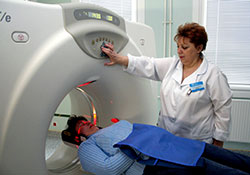Treatment

Nikolai Titov
A national cancer control programme should establish guidelines for integrating treatment resources with programmes for screening, early diagnosis, and palliative care, and provide therapeutic standards for the most important cancers in the country. The most effective and efficient treatment programmes are those that:
- are provided in a sustained and equitable way;
- are linked to early detection; and
- adhere to evidence-based standards of care and a multidisciplinary approach.
Cancer treatment may involve surgery, radiation therapy, chemotherapy, hormonal therapy or some combination of these. The selection should be based on evidence of the best existing treatment given the resources available. Combined modality therapy requires close collaboration among the entire cancer care team (surgeon, oncologist, radio-oncologist, pathologist, etc.). A multidisciplinary approach is critical to ensure high-quality treatment and the best outcomes.
Some cancers have high potential for being cured (such as testis cancer, early diagnosed breast cancer or acute lymphatic leukaemia in children), and others have good long-term survival rates (such as prostate cancer or advanced lymphomas). By contrast, patient survival rates for some other cancers (pancreas, liver and lung) remain low even in the most advanced settings.
The WHO list of essential medicines has been updated recently for proven clinically effective cancer treatment regimens. It now comprises 30 cytotoxic and adjuvant medicines, including some high-cost ones like imatinib, trastuzumab and rituximab. Governments and institutions around the world are using the WHO list to guide the development of their own lists of essential medicines, because they know that every medicine listed has been vetted for efficacy, safety and quality, and has been in a comparative cost–effectiveness evaluation with other alternatives in the same class of medicines.
The cost of establishing and maintaining cancer treatment facilities can be high. Keeping them concentrated in relatively few places in a country is therefore desirable to avoid draining resources that could valuably be devoted to other aspects of the work of a national cancer control programme.



